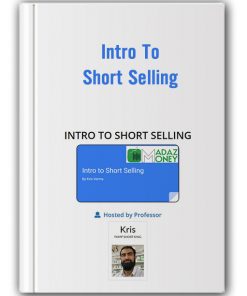Hosted by Professor
Kris Verma
Course Coverage/Topics
Learn the basics of short selling (brokers, trading setups, borrowing shares, order entry, etc.)
Learn about my A+ setups: the “Kris Verma Special” and Gap Up Short
Learn about trader psychology and how to control your emotions
Learn how to grow your account exponentially using the power of compounding and Kelly criterion
Learn proper risk management
Learn how to find edges through data tracking and excel spreadsheetsCourse Table Of Contents
Intro to Short Selling
Chapter 1: Intro to Short Selling
Introduction to the basics of short selling. Geared towards beginner traders or those new to short selling. This chapter goes over broker recommendations, risks/costs involved, trading layouts, entries and exists, and much more!
Lesson 1
Short Selling Basics (Part 1)
Lesson 2
Short Selling Basics (Part 2)
Chapter 2: Trader Psychology
Learn how to control your emotions with practical tools to apply while trading. Identifying triggers as they come and how to handle them is what makes or breaks traders. Learn from a pro trader how to manage these impulses before acting upon them.
Lesson 3
Trader Psychology (Part 1)
Lesson 4
Trader Psychology (Part 2)
Chapter 3: The “Kris Verma Special”
In this chapter we will discuss my A+ short setup, the “Kris Verma Special”. Setup criteria, entry points, position sizing, risk parameters and cover criteria are discussed in depth.
Lesson 5
The “Kris Verma Special” (Part 1)
Lesson 6
The “Kris Verma Special” (Part 2)
Chapter 4: The Gap Up Short
In this chapter we will discuss my A+ short setup, the Gap Up Short. Setup criteria, entry points, position sizing, risk parameters and cover criteria are discussed in depth.
Lesson 7
The Gap Up Short (Part 1)
Lesson 8
The Gap Up Short (Part 2)
Chapter 5: Mathematical Approach to Trading
In this chapter we will discuss the mathematical side to trading. We will learn to quantify our edge and apply it properly using Kelly optimized position sizing in order to maximize growth and exponential compounding.
Lesson 9
Mathematical Approach to Trading (Part 1)
Lesson 10
Mathematical Approach to Trading (Part 2)
Chapter 6: Data Tracking
This chapter revolves around my favorite subject, data! You will learn how and what to track using spreadsheets in order to run backtests and identify edges.
Lesson 11
Data Tracking (Part 1)
Lesson 12
Data Tracking (Part 2)
Chapter 7: Trade Review
Practical component of the course begins. We will discuss live trades once weekly on Saturdays with Q/A.
Lesson 13
Trade Review (Part 1)
Lesson 14
Trade Review (Part 2)
Lesson 15
Trade Review (Part 3)
Lesson 16
Trade Review (Part 4)
Lesson 17
Trade Review (Part 5)
Lesson 18
Trade Review (Part 6)
Course Available





